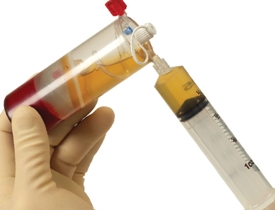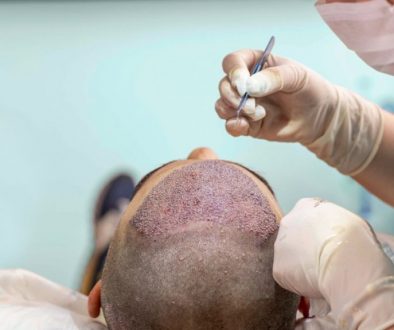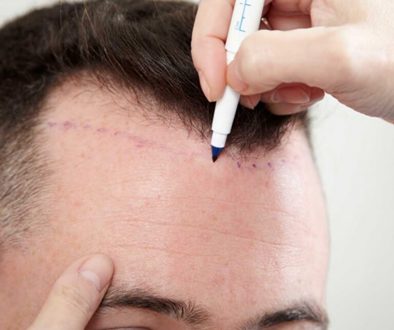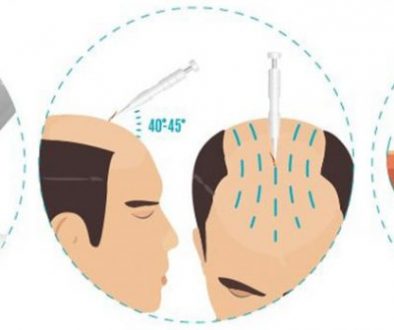Is Platelet Rich Plasma (PRP) an Effective Hair Loss Treatment?
 Injectable solutions represent an exciting new prospect in hair restoration therapy. Of all the injectable hair loss solutions being trialed today, one of the most researched is Platelet Rich Plasma or “PRP.”But what is PRP? Is it effective? And what are leading physicians and hair loss researchers saying about PRP injections?
Injectable solutions represent an exciting new prospect in hair restoration therapy. Of all the injectable hair loss solutions being trialed today, one of the most researched is Platelet Rich Plasma or “PRP.”But what is PRP? Is it effective? And what are leading physicians and hair loss researchers saying about PRP injections?
Platelet Rich Plasma (PRP) refers to a process where blood is extracted from a patient and separated into its natural components: red blood cells, white blood cells, platelets, and plasma. After another separation process (centrifugation), a portion of the blood plasma that is enriched with platelets (the molecules responsible for creating “blood clots” in the body) is isolated and preserved. At this point, the platelet enriched plasma is injected back into the patient.
Although its use in hair restoration is novel, the PRP process is not a new therapy. For a number of years, PRP was used in medical and surgical practices to enhance tissue regeneration and accelerate wound healing. During the centrifugation process the platelet enriched plasma becomes naturally enhanced with growth factors, anti-inflammatory molecules, and cellular signaling elements. When applied to post-surgical wounds and worn body tissue, these factors decrease damaging inflammation and allow for improved healing. According to many hair loss experts, when injected into the scalp, these factors are able to revitalize hair follicles and potentially create some actual hair re-growth.
Although the theory behind PRP is sound, the research proving its effectiveness is not as conclusive. According to one study conducted by two hair restoration physicians in France, PRP increases both the density of existing hair and also causes new hair growth. During their experiment, the French research team noted a 22.4% increase in the number of existing hairs and “denser” hair after 3 months of PRP treatment. However, during another clinical research trial in the US, only 1 out of a total of 36 patients treated with PRP showed any signs of increased hair growth or density. Based upon this wide range of data, it’s difficult to say whether or not PRP is an effective injectable hair loss treatment.
However, many hair restoration experts have trialed PRP in their own practices and do believe it is effective. One of these physicians is Coalition hair transplant surgeon Dr. Alan Feller. According to Dr. Feller:
My initial interest in PRP was based on the ability to offer a useful and practical treatment for patients who were not candidates for surgical hair restoration, ie: most woman and young men who are just beginning the miniaturization process. I’m a massive skeptic about everything in general, but some of these PRP results are quite impressive. One of my female patient’s results are about as clear cut as you get and she is truly over the moon with it. She said her hair stylist noticed the obvious improvement without knowing she received PRP treatment; and that kind of confirmation is priceless.
To view some of Dr. Feller’s patients treated with PRP and read more of his opinion regarding the treatment, please see the following: Dr. Alan Feller – PRP Results.
While many hair restoration physicians believe PRP is effective as an injectable solution, others feel it may serve another important purpose in hair transplant surgery: acting as a quality storage solution for extracted follicular unit grafts (FUGs). After grafts are extracted during hair transplant surgery (either via the strip removal method or the follicular unit extraction method) they are usually preserved in a fluid before being implanted into the scalp. The purpose of this fluid is to keep the grafts viable and ensure they are healthy by the time they are placed in the recipient area. Most physicians use simple solutions like normal saline (which is simply water and salt), but others are now beginning to see healthier grafts and impressive hair transplant growth while using storage mediums like PRP. Some physicians are even using platelet/plasma mixtures to store grafts and also injecting PRP into the scalp during the same procedure.
Altogether, it seems as if the “jury is still out” when it comes to PRP as an injectable hair loss solution. Some studies show significant increase in hair density and new hair growth with PRP treatment, while others see essentially no significant results from the serum. What’s more, despite the conflicting evidence, some hair restoration physicians believe PRP is effective and can be used as a stand-alone injectable treatment, a storage solution for grafts during hair transplant surgery, and also an injectable healing agent in hair transplant surgery. As time goes on, we will likely see more PRP research and gain a better understanding of whether or not it truly treats hair loss. For now, it’s likely that patients should remain “cautiously optimistic” toward PRP treatment, and thoroughly research it before undergoing any sort of PRP procedure.
_______
Blake Bloxham – formerly “Future_HT_Doc”
Editorial Assistant and Forum Co-Moderator for the Hair Transplant Network, the Hair Loss Learning
Center, the Hair Loss Q&A Blog, and the Hair Restoration Forum
Follow our community on Twitter
Watch hair transplant videos on YouTube
Technorati Tags: hair restoration, hair loss, Platelet Rich Plasma, PRP, hair loss treatment, hair transplant, hair transplant surgery



